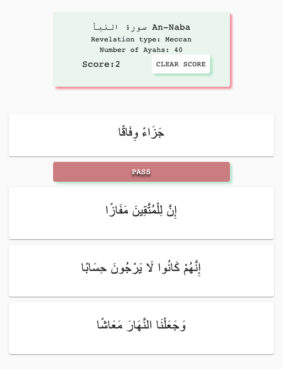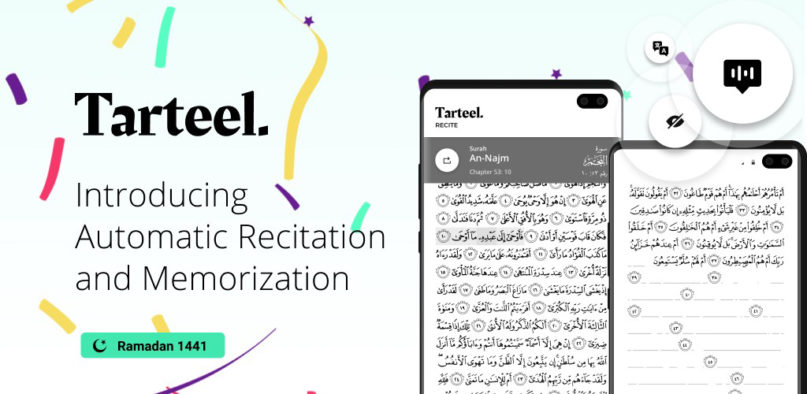(RNS) — During Ramadan, the month in which the Quran was revealed, Muslims around the world devote extra time to reading the holy book. Many attempt to complete a full recitation of the Arabic scripture, which contains nearly 77,500 words, and memorize as much of it as they can.
Now, with apps like Tarteel and Taaloom, tens of thousands of Muslims are turning to technology to continue the sacred practices of hifz, or preserving the entirety of the Quran through memorization, and tarteel, or melodic recitation, that have continued on since the Prophet Muhammad.
This year, one week into the holy month, Moroccan developer Othmane Ouali launched Taaloom, a web app that quizzes users on the chapter or part they are memorizing. He and his friends are using it to compete with memorization among themselves; eventually he plans to add a ranking system.
“It’s a platform to test and practice what you’re learning by heart,” Ouali explained. “Sure, you can find Quran apps, but they aren’t gamified. I think people will learn better when it is competitive because it’s a fun way.”
Other Quran memorization apps, including Nuqayah’s Al-Muqri, Bigitec’s Memorize Quran Pro and Muslim Central Project’s Memorize Quran, have also seen usage jump during Ramadan.
But Tarteel, which its developers call “the world’s first AI-enabled Quran recitation app,” has set itself apart with speech recognition software, using machine learning technology to help users practice their memorization and study of the Quran.
“The idea of the app is to use artificial intelligence to listen to people’s Quran recitation and identify their mistakes,” said co-founder Abdellatif Abdelfattah, a software engineer who works at Twitter. His co-founders, Anas Abou Allaban and Mohamed Moussa, are software engineers at Amazon and Facebook respectively.
Tarteel has been in development for the last two years. It was founded at Muslim Hacks, a hackathon Abdelfattah led in the Bay Area in 2018, as a tool to let students receive feedback without a Quran teacher.
RELATED: At Muslim hackathon, techies build community and tools to access Islamic learning
Since then, more than 30,000 people have used Tarteel’s mobile apps; more than double that number have used the web app.
Users can pull up the app and begin reciting any verse of the Quran, and the app will automatically identify which verse they are reciting, following along with the recitation.
“You can imagine, if you’re following a prayer — like in taraweeh (Ramadan’s intense night prayers) particularly — you can pull up your phone and see what the imam is reciting,” Abdelfattah said. “By next Ramadan we want to also show the translation side-by-side.”
One of its most popular functions is a memorization mode, which hides the verses and only reveals them word-by-word as the user recites.
The app will also alert users to any errors in their recitation, such as an incorrect word or skipping a verse. In the future, it will also correct pronunciation errors, catching minute details such as vowel marks and how long certain sounds should be prolonged.

The Taloom app provides users with a verse of the Quran and quizzes them on the following verse. Here, it asks a user to select the 17th verse of Surah Naba, the 78th chapter of the Quran. Image courtesy of Taaloom
That goal, while still a ways off for his team, has been made more urgent by the coronavirus outbreak, which has closed down mosques and Islamic schools.
“We have gotten the feedback a lot that people would like to see the live feedback as soon as possible because of the situation,” Abdelfattah said. “Because, especially now, students don’t always have teachers available next to them to correct their mistakes.”
But to create such a precise machine learning model requires a vast data set to train a deep neural network. Such samples of ordinary Muslims’ Quran recitations didn’t exist when the project began. So Tarteel’s users, if they opt in to submitting their audio recordings, are simultaneously crowdsourcing the world’s largest data set of amateur reciters.
“We couldn’t use audio of the available professional reciters because fundamentally, the way they recite the Quran is different from the average person,” Abdelfattah said. Their level of tajweed, or knowledge of the rules of recitation, is extremely high. Their recordings have no background noise. And they are primarily male and Arab.
So far, Tarteel’s open source database contains about a quarter of a million anonymized contributions, about 35% of which are from women.
The more people who contribute their unique recitation, the larger the data set grows, which advances the app’s machine learning algorithm’s ability to recognize each verse despite different accents, pitches, melodies and background noise.
The developers therefore encourage users reciting the Quran casually to open up the app and record their audio, which will help accelerate subsequent features and increase accuracy.
“If we were to build a model that understands how average Muslims recite, we need to get a very diverse data set,” Abdelfattah explained. “If we want, for example, a female in Nigeria to be able to use Tarteel correctly, we need to have several samples on how females from Nigeria recite the Quran.”
Still, users say they have been amazed by the level of accuracy in the app’s popular “Shazam for Quran” feature: Begin reciting a verse, and the app will automatically identify where in the Quran you’re reading from.
Feryaal Tahir, a student at Chicago’s DePaul University, has found herself reaching for the app repeatedly during Ramadan to follow along with Quranic references while listening to lectures by Islamic scholars.
But she’s also found an unexpected use for the app. As a volunteer for the disability rights advocacy nonprofit Muhsen, Tahir said, she has found the app to be a godsend for making Islamic content accessible for deaf and hard-of-hearing listeners.
RELATED: At Gallaudet University, deaf culture and faith mix to create something new
Tahir’s team at Muhsen spends hours every day producing video captions for lectures by prominent Imams Omar Suleiman and Yasir Qadhi. The app has been “life-changing” for their workflow, she said, speeding up the process of captioning any Quranic verses included in the lectures.
“A lot of times when the shayookh (sheikhs) start referencing the Quran, those Arabic words will get auto-captioned into nonsense in English so it’s hard for people to understand what’s happening,” Tahir said.
“So we use the app to pick up the exact ayah (verse) they’re mentioning in their lecture and we’re able to plug it straight into the caption with the verse number, transliteration and translation so they’re accurate,” she said. “It’s helping a lot of people, even if they’re not deaf or hard of hearing.”
In the future, the Tarteel team says, the crowdsourced data can be used to build other applications, such as mosque kiosks that display an imam’s Quranic recitation, as well as the verses’ translation, in real time.
“No one else is actually doing this at the scale that we are,” Abdelfattah said. “But it would be amazing to see this idea getting more traction and more people trying to solve this.”





